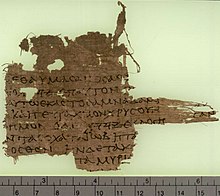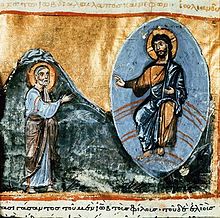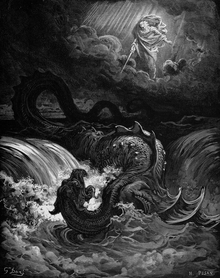Book of Job
[5] In chapter 1, the prologue on Earth introduces Job as a righteous man, blessed with wealth, sons, and daughters, who lives in the land of Uz.[28] His three friends, Eliphaz the Temanite, Bildad the Shuhite, and Zophar the Naamathite, visit him, accuse him of sinning, and tell him that his suffering was deserved.[29] Job asserts that since a just God would not treat him so harshly, patience in suffering is impossible, and the Creator should not take his creatures so lightly, to come against them with such force.He suggests that God does nothing to punish the wicked, who have taken advantage of the needy and the helpless, who, in turn, have been left to suffer the significant hardships inflicted on them.it asks; it concludes in chapter 28 that wisdom has been hidden from humankind)[38] Job contrasts his previous fortune with his present plight as an outcast, mocked and in pain.[41] Instead, God changes the subject to human frailty and contrasts Job's weakness with divine wisdom and omnipotence: "Where were you when I laid the foundations of the earth?"[46] The anonymous author was almost certainly an Israelite—although the story is set outside Israel, in southern Edom or northern Arabia—and alludes to places as far apart as Mesopotamia and Egypt.[47] Despite the Israelite origins, it appears that the Book of Job was composed in a time in which wisdom literature was common but not acceptable to Judean sensibilities (i.e., during the Babylonian exile and shortly thereafter).[54] The three books of wisdom literature share attitudes and assumptions but differ in their conclusions: Proverbs makes confident statements about the world and its workings that Job and Ecclesiastes flatly contradict.[67] The intruder, Elihu, rejects the arguments of both parties: That is, suffering can make those afflicted more amenable to revelation – literally, "open their ears" (Job 36:15)."[72] When God finally speaks he neither explains the reason for Job's suffering (known to the reader to be unjust, from the prologue set in heaven) nor defends his justice.[75] In the concluding part of the frame narrative God restores and increases Job's prosperity, indicating that the divine policy on retributive justice remains unchanged.[76] In the Second Temple period (500 BCE–70 CE), the character of Job began to be transformed into something more patient and steadfast, with his suffering a test of virtue and a vindication of righteousness for the glory of God.[84][85] Augustine of Hippo recorded that Job had prophesied the coming of Christ, and Pope Gregory I offered him as a model of right living worthy of respect.[87] Jewish liturgy does not use readings from the Book of Job in the manner of the Pentateuch, Prophets, or Five Megillot, although it is quoted at funerals and times of mourning.Archibald MacLeish's drama JB, one of the most prominent uses of the Book of Job in modern literature, was awarded the Pulitzer Prize in 1959."The Sire of Sorrow (Job's Sad Song)" is the final track on Joni Mitchell's 15th studio album, Turbulent Indigo.[96] In the 3rd episode of the 15th season of ER, the lines of Job 3:23 are quoted by doctor Abby Lockhart shortly before she and her husband (Dr. Luka Covac) leave the series forever.[citation needed] In Lebanon the Muwahideen (or Druze) community have a shrine built in the Shouf area that allegedly contains Job's tomb.







Iyobinte PustakamTanakhTorah (Instruction)GenesisExodusLeviticusNumbersDeuteronomyNevi'im (Prophets)JoshuaJudgesSamuelIsaiahJeremiahEzekielMinor ObadiahHabakkukZephaniahHaggaiZechariahMalachiKetuvim (Writings)PsalmsProverbsFive Megillot (Scrolls)Song of SongsLamentationsEcclesiastesEstherDanielEzra–NehemiahChroniclesOld TestamentHistorical1–2 Samuel1–2 Kings1–2 ChroniclesNehemiahWisdomPropheticMajor prophetsMinor prophetsDeuterocanonicalJudith1 Maccabees2 MaccabeesWisdom of SolomonSirachBaruchLetter of JeremiahAdditions to Daniel1 Esdras2 EsdrasPrayer of ManassehPsalm 1513 Maccabees4 MaccabeesOrthodox TewahedoJubilees1, 2, and 3 MeqabyanParalipomena of BaruchBroader canonPapyrus Oxyrhynchus 3522Biblical HebrewKetuvimHebrew BiblePoetic BooksChristian BibleHebrewAramaicPersian periodthe problem of eviltheodicyeponymouschapter 28EliphazBildadZopharWilliam BlakeIllustrations for the Book of Jobchapter 1land of Uzchapter 2chapter 3Eliphaz the TemaniteBildad the ShuhiteZophar the NaamathitetheologyIlya RepinwhirlwindomnipotenceJob 42lack of knowledgea burnt offeringpre-incarnateBook of EzekielparableIsraeliteMesopotamiawisdom literatureBabylonian exileArabicEdomiteMasoretic TextSeptuagintDead Sea ScrollsVulgateNew Revised Standard VersionProtestant BiblesBook of EstherSephardicAshkenazicCatholicJerusalem Biblebooks of the MaccabeesBook of ProverbsGustave Doréproblem of evilretributive justicecovenantbehemothleviathanSecond TempleTestament of JobEpistle of James